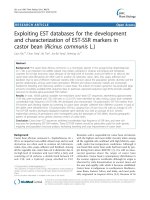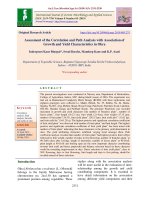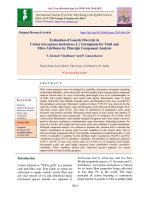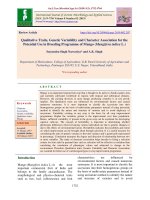Character association for yield parameters in yam bean [Pachyrhizus erosus (L.) Urban]
Bạn đang xem bản rút gọn của tài liệu. Xem và tải ngay bản đầy đủ của tài liệu tại đây (208.89 KB, 6 trang )
Int.J.Curr.Microbiol.App.Sci (2020) 9(3): 192-197
International Journal of Current Microbiology and Applied Sciences
ISSN: 2319-7706 Volume 9 Number 3 (2020)
Journal homepage:
Original Research Article
/>
Character association for yield parameters in Yam bean
[Pachyrhizus erosus (L.) Urban]
Deep Shikha* and Ashish Narayan
Department of Plant Breeding and Genetics, TCA, Dholi, Dr. RPCAU, Pusa, Bihar, India
*Corresponding author
ABSTRACT
Keywords
Yam bean,
germplasm,
character
association, yield
parameters.
Article Info
Accepted:
05 February 2020
Available Online:
10 March 2020
A field experiment was carried out with 28 yam bean germplasm along
with 2 released variety namely Rajendra Misrikand-1(RM-1) and Rajendra
Misrikand-2 (RM-2) laid out in a Randomised Block Design (RBD) with
all recommended agronomic practices during kharif – 2017 and these
genotypes have been studied for twelve different characters in association
between seed and tuber yield and yield components. Tuber weight showed
significant and positive correlation with tuber yield. Pods per plant and pod
weight per plant exhibited significant and positive correlation with seed
yield. Number of seeds per pod exhibited significant and positive
correlation with pod length and pod weight per plant was found to have
significant and positive correlation with pods per plant. Pods per plant
exhibited significant and positive correlation with number of branches per
plant. Such correlation indicates true relationship and thus assists in
predicting tuber or seed yield.
and is mainly self-pollinating. Yam beanis
propagated by seed and needs to have the
fertile shoots pruned repeatedly during the
growing season in order to produce a higher
tuber yield (Noda and Kerr 1983).
Introduction
The Yam bean (Pachyrhizus spp.) is one of
the legume root crops. Yam bean crop was
introduced into India during the period
between 1880 and 1890 (Anonymous 1889a;
Tiwari et al., 1977). The main cultivation of
the Yam bean takes place in parts of West
Bengal, Assam, Bihar, Orissa and Andhra
Pradesh. In India, it is most commonly grown
in North Bihar including eastern Uttar
Pradesh. The yam bean has bisexual flowers
It has herbaceous vine with great variation in
the outline of the leaflets, from dentate to
palmate (Sorensen, 1996). Yam bean provides
high tuber yields and as a legume it produces
protein rich food and improves sustainability
in cropping systems (NRC, 1979). The mature
192
Int.J.Curr.Microbiol.App.Sci (2020) 9(3): 192-197
seeds of the yam bean are not used due to the
high rotenone content (about 0.5% to 1% seed
weight).
Results and Discussion
The correlation at genotypic and phenotypic
levels were computed from variance and
covariance values for pairs of all the
characters under study and has been presented
in the Tables 1, 2 & 3.
Correlation is the measure of degree and
direction of association of one variable with
other variable and determines how these
characteristics vary together or whether there
is any relationship between any two such
characters.
From the perusal of table 1, Tuber yield
showed significant and positive correlation
with tuber weight, indicating it as a single
parameter for selection to increase tuber yield.
Similar finding was reported by Nielson and
Sorenson (2000) in yam bean and by Eze and
Nwofia (2016) in Colocasia, that yield and
yield associated traits observed significant
positive association. Tuber yield was found to
have positive association with plant height.
Paul and Bari (2013) reported similar finding
in Elephant Foot Yam.
Materials and Methods
The experimental material comprised of 30
germplasm accessions of yam bean
[Pachyrhizus erosus (L.) Urban] including
two released varieties, ‘Rajendra Misrikand1’ (RM-1) and ‘Rajendra Misrikand-2’ (RM2).
These genotypes were collected from the
germplasm collection maintained at Dholi
centre and the present investigation had been
carried out at Dholi research farm of
Dr.Rajendra Prasad Central Agricultural
University, Pusa, and Bihar during kharif2017.The experiment was conducted in a
randomised block design with three
replications.
However, tuber yield showed negative and
non-significant association with seed yield
indicating that both seed yield and tuber yield
are not complementing each other. Similarly
Akinyosoye et al., (2017) also reported that
non-significant relationship existed between
tuber and seed yield per plant. Tuber yield
recorded negative association with pods per
plant, pods per peduncle, number of seeds per
pod and seed yield indicating that varieties
should be developed in desired direction by
considering these traits.
The characters studied were Plant height,
Number of branches per plant, Days to 50%
flowering, Pods per plant, Pod weight per
plant, Pods per peduncle, Pod length, Number
of seeds per pod, Tuber weight, Dry matter,
Tuber yield and Seed yield.
From the perusal of table 2, it is observed
that, Seed yield showed significant and
positive correlation with pods per plant and
pod weight per plant. This indicates that
germplasm showing high value for pods per
plant and pod weight per plant will have
increased seed yield.
Data for different characteristics were
statistically analyzed for their association as
per the standard methods. The plot had
uniform topography, fertile and well-drained
soil with subtropical climate of humid nature
and is characterised by hot summer, moderate
to heavy rainfall and cold winter. The rainfall
is distributed mainly between middle of June
to middle of October with average rainfall of
about 1000 mm only.
Ojuederie et al., (2015) also reported similar
finding, that a highly significant correlation
was observed between seed yield and weight
of total pods per plant.
193
Int.J.Curr.Microbiol.App.Sci (2020) 9(3): 192-197
Table.1 Correlation between tuber yield and other characters
S.No.
Characters
Correlation coefficient
Genotypic
0.1250
Phenotypic
0.1464
1.
Plant height (cm)
2.
No. of branches per plant
0.1881
0.1289
3.
Days to 50% flowering
0.4497
0.2973
4.
Pods per plant
-0.0465
-0.0394
5.
Pod weight per plant (g)
0.1537
0.1212
6.
Pods per peduncle
-0.2493
-0.1477
7.
Pod length (cm)
-0.0205
-0.0090
8.
No. of seeds per pod
0.0028
-0.0081
9.
Tuber weight (g)
0.7775
0.7363**
10.
Dry matter (%)
0.2600
0.1898
11.
Seed yield (kg/plot)
-0.3070
-0.2624
**Significant at 1% level
Table.2 Correlation between seed yield and other characters
S.No.
Characters
Correlation coefficient
Genotypic
Phenotypic
1.
Plant height (cm)
-0.1133
-0.0467
2.
No. Of branches per plant
0.0283
0.0906
3.
4.
Days to 50% flowering
Pods per plant
-0.3964
0.6224
-0.2643
0.5072**
5.
Pod weight per plant (g)
0.5904
0.4564**
6.
Pods per peduncle
0.1369
0.0188
7.
Pod length (cm)
0.3760
0.2446
8.
No. of seeds per pod
0.1850
0.1872
9.
Tuber weight (g)
-0.2194
-0.1621
10.
11.
Dry matter (%)
Tuber yield (kg/plot)
-0.0297
-0.3070
-0.0594
-0.2624
**Significant at 1% level
194
Int.J.Curr.Microbiol.App.Sci (2020) 9(3): 192-197
Table.3 Inter-relationship of tuber yield and seed yield attributing characters at
phenotypic and genotypic level
S.No.
Characters
1.
Plant height(cm)
2.
No. Of branches per plant
3.
Days to 50% flowering
4.
Pods per plant
5.
Pod weight per plant(g)
6.
Pods per peduncle
7.
Pod length (cm)
8.
No. of seeds per pod
9.
Tuber weight(g)
10.
Dry matter (%)
11.
Tuber yield (kg/plot)
12.
Seed yield (kg/plot)
PH
NBPP
DFF
PoPP
PoWPP
PoPPe
PoL
NSPP
TW
DM
TY
P
G
P
G
P
G
P
G
P
G
P
G
P
G
P
G
P
G
P
G
P
G
P
1.0000
1.0000
0.2408
0.2369
-0.0665
-0.0401
0.2184
0.2564
0.0782
0.0620
0.0018
-0.2073
0.1610
0.1253
0.1571
0.3215
0.2514
0.3147
-0.0565
0.0376
0.1464
0.1250
-0.0467
1.0000
1.0000
-0.0673
0.1624
0.3322*
0.5091
0.2102
0.3405
0.1543
0.4247
0.1588
-0.0717
0.0745
-0.2081
0.0438
-0.0257
-0.1711
0.0306
0.1289
0.1881
0.0906
1.0000
1.0000
-0.1564
-0.1997
-0.2364
-0.5394
0.1899
0.3629
0.0319
-0.0097
0.1404
0.3660
0.1961
0.3084
0.0660
-0.0250
0.2973
0.4497
-0.2643
1.0000
1.0000
0.4977**
0.5072
0.0424
-0.0306
0.1744
0.3697
0.2034
0.3769
0.0764
0.0735
-0.0500
-0.0862
-0.0394
-0.0465
0.5072**
1.0000
1.0000
-0.0354
0.0149
0.0471
0.1112
0.0105
0.0110
0.1935
0.2329
-0.2256
-0.2185
0.1212
0.1537
0.4564**
1.0000
1.0000
0.2957
0.6518
-0.1076
0.0389
-0.1693
-0.2742
-0.0320
-0.1404
-0.1477
-0.2493
0.0188
1.0000
1.0000
0.4216**
0.3954
-0.0777
-0.1447
0.0671
0.0171
-0.0090
-0.0205
0.2446
1.0000
1.0000
0.0430
0.0584
0.0640
0.1448
-0.0081
0.0028
0.1872
1.0000
1.0000
0.0684
0.1788
0.7363**
0.7775
-0.1621
1.0000
1.0000
0.1898
0.2600
-0.0594
1.0000
1.0000
-0.2624
G
-0.1133
0.0283
-0.3964
0.6224
0.5904
0.1369
0.3760
0.1850
-0.2194
-0.0297
-0.3070
G = Genotypic correlation
P = Phenotypic correlation
(*) Significant at 5% level
(**) Significant at 1% level
195
Int.J.Curr.Microbiol.App.Sci (2020) 9(3): 192-197
Seed yield recorded negative association with
plant height, days to 50% flowering, tuber
weight, dry matter and tuber yield. Therefore,
selection for long duration vigorous plants
with good tuber yield will cost over seed
yield.
non-significant association. Pod length was
found to have positive but non-significant
association with plant height, number of
branches per plant, days to 50% flowering,
pods per plant, pod weight per plant and pods
per peduncle showing their relationship with
each other.
The nature and magnitude of inter
relationship among all character pairs were
calculated at genotypic and phenotypic level
to ascertain the inter relationship among the
characters under study.
Interrelationship
among all twelve characters studied is
presented in the Table 3.Dry matter recorded
positive association with tuber yield. It also
showed
positive
but
non-significant
association with Days to 50% flowering, Pod
length and Number of seeds per pod.
However, it showed negative and nonsignificant association with Plant height,
Number of branches per plant, pods per plant,
pod weight per plant and pods per
Peduncle.Tuber weight showed positive but
non-significant association with plant height,
number of branches per plant, days to 50%
flowering, pods per plant, pod weight per
plant and number of seeds per pod. However,
it was found to have negative but nonsignificant association with pods per peduncle
and pod length.
Pods per peduncle showed positive but nonsignificant association with plant height,
number of branches per plant, days to 50%
flowering and pods per plant while pod
weight per plant showed negative and nonsignificant association. Pod weight per plant
was found to have positive and significant
association with pods per plant. However,
characters like plant height and number of
branches per plant showed positive but nonsignificant correlation while days to 50%
flowering showed negative and nonsignificant correlation.
Pods per plant showed significant and
positive association with number of branches
plant while positive but non-significant
association with plant height. However, it
showed
negative
and
non-significant
association with days to 50% flowering. In
the present investigation, days to 50%
flowering showed negative and nonsignificant association with plant height and
number of branches per plant. Number of
branches per plant was found to have positive
but non-significant association with plant
height.
Number of seeds per pod showed significant
and positive association with pod length
indicating that if pod length increases, number
of seeds per pod also increases. Similar
finding was reported by Popoola et al.,
(2011) in African yam bean and they reported
that pod length was significantly correlated
with number of seeds per pod. However,
characters like plant height, number of
branches per plant, days to 50% flowering,
pods per plant and pod weight per plant were
found to have positive but non-significant
correlation with number of seeds per pod,
while pods per peduncle showed negative and
Therefore, it could be concluded that tuber
yield had positive significant association tuber
weight and seed yield had positive and
significant association with pods per plant and
pod weight per plant. Hence, selection for any
of these characters would bring in
simultaneous improvement of respective
yield.
196
Int.J.Curr.Microbiol.App.Sci (2020) 9(3): 192-197
(2013). Genetic Variability and Trait
Association Studies in African Yam
Bean (Sphenostylis sternocarpa) Hochst
ex A. Rich. American-Eurasian J.
Agric. & Environ. Sci. 13(11): 15471553.
Ojuederie,
O.B.,
Balogun,
M.O.,
Akande,S.K., Korie, S. and Omodele, T.
(2015). Intraspecific Variability in
Agro-Morphological Traits of African
Yam Bean (Sphenostylis stenocarpa
(Hochst ex. A. Rich) Harms). J. Crop
Sci. Biotech.18(2): 53-62.
Popoola, J.O., Adegbite, A.E., Obembe, O.O.
and
Agbolade,
J.O.(2011).
Reproductive mechanisms and pollen
characterization in some accessions of
an underutilized legume: (Sphenostylis
stenocarpa Hochst Ex. A. Rich) harms.
International Journal of Biodiversity
and Conservation. 3(6): 185-192.
Singh, S.K. and Tripathi, S.M.(2012).
Genetical
Studies
on
Zimikand
(Amorphophallus
campanulatus
Blume.).
Hort.
Flora
Research
Spectrum.1(1): 77-79.
Sørensen, M. (1996). Yam bean (Pachyrhizus
DC.). Promoting the conservation and
use of underutilized and neglected
crops. 2. Institute of Plant Genetics and
Crop plant Research, Gatersleben/
International Plant Genetic Resources
Institute, Rome.
References
Akinyosoye, S.T., Adetumbi, J.A., Amusa,
O.D., Agbeleye, A., Anjorin, F.,
Olowolafe, M.O. and Omodele,
T.(2017). Bivariate analysis of the
genetic variability among some
accessions of African Yam Bean
(Sphenostylis stenocarpa (Hochst ex A.
Rich) Harms). Acta Agriculturae
Slovenica.109(3): 493 - 507
Eze, C.E. and Nwofia, G.E.(2016). Variability
and Inter-Relationships between Yield
and Associated Traits in Taro
(Colocasia esculenta (L.) Schott).
Journal of Experimental Agriculture
International.14(2): 1-13.
National Research Council (NRC). (1979).
Tropical Legumes: Resources for the
Future. National Academy of Sciences
Press, Washington, D.C.
Nielsen, P.E. and Sorensen, M. (2000). Yield
potential of yam bean [Pachyrhizus
erosus(L.) Urban] accessions in the
kingdom of Tonga, South Pacific.
Tropical
Agriculture
(Trinidad).
77(3):174-179.
Noda, H. and Kerr, W.E., (1983). The effects
of staking and inflorescence pruning on
the root production of Yam Bean
(Pachyrrhizus erosus Urban). Trop.
Grain Leg. Bull.27: 35-37.
Nwofia, G.E., Awaraka, R.O. and Agbo, C.U.
How to cite this article:
Deep Shikha and Ashish Narayan. 2020. Character association for yield parameters in Yam
bean [Pachyrhizus erosus (L.) Urban]. Int.J.Curr.Microbiol.App.Sci. 9(03): 192-197.
doi: />
197






![Combining ability studies in forage sorghum [Sorghum bicolour (L.) Moench] for yield and quality parameters](https://media.store123doc.com/images/document/2020_01/09/medium_uoj1578577680.jpg)


